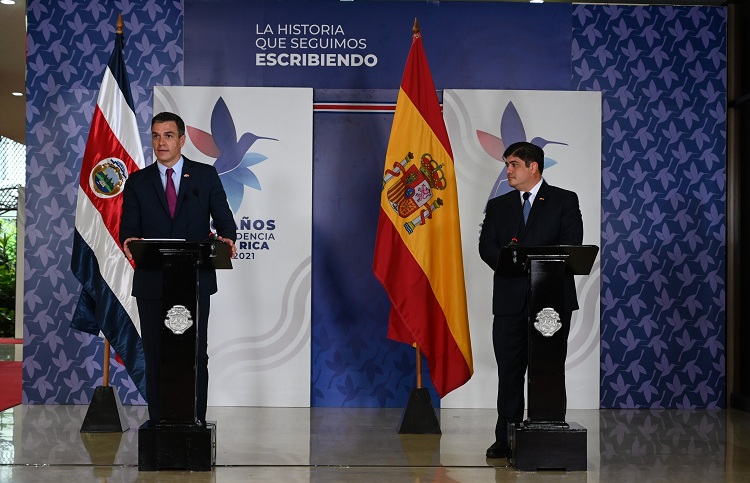The Diplomat
The President of the Government, Pedro Sánchez, concluded yesterday his Latin American tour in Costa Rica, where he defended “democracy and the fulfillment of human rights” in Central America and called on the President of Nicaragua, Daniel Ortega, to “play fair and release the opponents”.
“I would like to address personally and directly to President Ortega: that he plays fair, that he frees the opponents and that he participates, in fair play and in good leadership, in this electoral process”, declared Sánchez during the joint press conference with the President of Costa Rica, Carlos Alvarado. According to Sánchez, Spain defends the same position of the European Union in favor of a “firm defense of rights, liberties and democratic values” and views with “great concern what is happening in Nicaragua which, by the way, is not new, we have been dragging it for some years”.
During his meeting with Alvarado, the two leaders discussed bilateral relations, the Central American integration process, the migration situation and forced displacements in Central America, and the need to promote a sustainable and inclusive economic recovery after the pandemic. In the press conference that followed, Sánchez assured that Spain and Costa Rica “share the same vision of the region, which must be based on democracy and compliance with human rights” and congratulated Carlos Alvarado for the celebration of the Bicentennial and for the recent incorporation of Costa Rica to the OECD, an adhesion that “Spain has always encouraged and supported”.
Business Forum
The President of the Government, who traveled accompanied by the Minister of Foreign Affairs, Arancha González Laya; the Minister of Industry, Trade and Tourism, Reyes Maroto; and with a large delegation of Spanish businessmen, closed with the Costa Rican President a business-union meeting between the two countries, which was attended by Spanish companies from sectors such as telecommunications, food, bridge infrastructure, management of transport infrastructure concessions, engineering and architecture, gaming and leisure, and consulting, among others.
During the event, Sánchez recalled that Spanish companies “are deeply committed to the future of Costa Rica by investing in boosting its energy resources and developing its technological capabilities” and wish to “participate in the great transformation” undertaken by this country, the second in Central America with the largest Spanish business presence. For his part, Alvarado affirmed that the bilateral relationship between the two countries has not “exploited its full potential”.
At the same event, the president of the CEOE, Antonio Garamendi, highlighted “the great confidence” of Spanish companies “in the most advanced country in Central America, which enjoys great political stability, an open economy and a very favorable business climate”, and expressed, on behalf of the CEOE and the Spanish Chamber of Commerce, his support for the reforms initiated by the Costa Rican government in terms of fiscal and public sector consolidation, aimed at ensuring the medium and long-term viability of the national economy.
On the other hand, Pedro Sánchez’s visit to Costa Rica resulted in the signing of four memorandums of understanding on cybersecurity, bilateral consultations on politics, economy, trade, society and culture, infrastructure and transport and tourism and an Advanced Cooperation Agreement, the first of its kind to be signed and which articulates a new model of relations until 2029.
Likewise, the President of the Government received the keys to the city of San José de Costa Rica from the Mayor, Johnny Araya, and made a floral offering at the plaque dedicated to the Spanish emigrants in Costa Rica, installed in 2020 in the España Park. Before returning to Spain, and as the last appointment of the tour, Sanchez met with a group of prominent women of Costa Rican political, economic and social life to talk about entrepreneurship and political empowerment.






